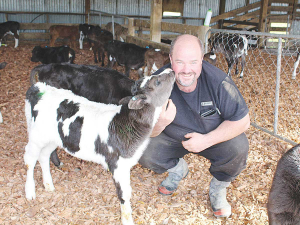Editorial: RMA reforms uproar
OPINION: The euphoria over the Government’s two new bills to replace the broken Resource Management Act is over.
 Southland Federated Farmers vice president Jason Herrick believe farmers in the region are well set up for winter grazing this year.
Southland Federated Farmers vice president Jason Herrick believe farmers in the region are well set up for winter grazing this year.
Southland farmers are well set up for winter grazing this season, according to Federated Farmers official Jason Herrick.
He made the comments after accompanying Environment Southland officials on surveillance flights last month.
"What was seen from the air is farmers are well set up for winter with articulate attention to critical source and waterway protection," Herrick told Rural News.
However, he points out that the dry weather facing the region means farmers are planting fewer crops for this winter.
"What was very apparent to me on the flight over western and northern Southland was how dry it was and the apparent lack of crop planted," Herrick explained.
"On that particular flight, we never saw any crops in paddocks and any paddock setups that were of concern. I guess those concerns come on the flight over eastern Southland the next day."
However, he adds that if farmers have sound management practices and don't bring attention to themselves, the winter should go smoothly.
Herrick, a junior vice president of Federated Farmers Southland, is also its winter grazing spokesperson.
Winter grazing involves the confinement of large numbers of stock to small feeding areas planted with annual forage crops.
Southland farmers have come under fire from environment lobbyists for poor winter grazing practices, prompting the Government to introduce new regulations that gives farmers three pathways for winter grazing.
The first pathway allows for grazing if it complies with national environmental standards for freshwater. The second pathway, which is currently unavailable, requires a “freshwater farm plan” to be submitted to show grazing won’t worsen water conditions.
The third will see farmers pay for resource consent through their regional council. In some cases, it could cost at least $1,000.
Environment Southland undertakes routine intensive winter grazing inspections. Its cultivation flights involve flying over areas of Southland to check paddocks in preparation for winter grazing.
Staff look for crops that have little or no buffering from waterways, are on steep slopes and crops planted within critical source areas that need careful management. ES staff will also be driving around the region, completing roadside inspections in coming weeks.
Environment Southland general manager catchment integration Paul Hulse says its main priority is to help farmers comply with the winter grazing rules in the National Environmental Standards for Freshwater that come into effect on 1 May. These rules mean farmers may need a consent or to be granted a deemed permitted activity.
“We appreciate the hard work farmers have already put in this year to prepare for winter,” Hulse says. “Our flights have shown careful planning has gone into cultivation across the region and that puts farmers in a good position before animals go onto crop.
“There are only a handful of properties which will be followed up with as a result of the cultivation flights.”
Following the flights and roadside assessments, land sustainability and compliance teams will determine the manner in which they follow up directly with farmers who have paddocks identified at risk.
“While we are pleased to see how well prepared farmers are, there is always the need to remain vigilant as we can never be sure what weather winter will bring,” Hulse says.
Global trade has been thrown into another bout of uncertainty following the overnight ruling by US Supreme Court, striking down President Donald Trump's decision to impose additional tariffs on trading partners.
Controls on the movement of fruit and vegetables in the Auckland suburb of Mt Roskill have been lifted.
Fonterra farmer shareholders and unit holders are in line for another payment in April.
Farmers are being encouraged to take a closer look at the refrigerants running inside their on-farm systems, as international and domestic pressure continues to build on high global warming potential (GWP) 400-series refrigerants.
As expected, Fonterra has lifted its 2025-26 forecast farmgate milk price mid-point to $9.50/kgMS.
Bovonic says a return on investment study has found its automated mastitis detection technology, QuadSense, is delivering financial, labour, and animal-health benefits on New Zealand dairy farms worth an estimated $29,547 per season.